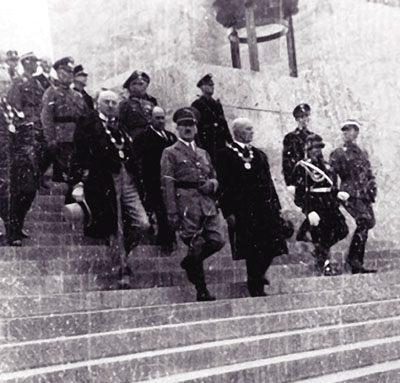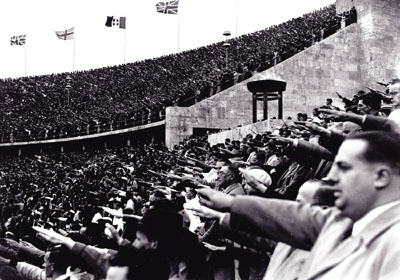 They would put on their folk dances for us. And they were very, very friendly. But, of course, from time to time, groups of German soldiers marched through the town. And that made a hush on everything.
They would put on their folk dances for us. And they were very, very friendly. But, of course, from time to time, groups of German soldiers marched through the town. And that made a hush on everything.
Here, Esther Wenzel '34 describes the atmosphere of Oetz, Austria, during her 1936 trip there, in a 1998 interview with Rita Pearce '96/98, then a graduate student at WSU's Elliott School of Communication.
Wenzel's account of pre-WWII Europe, along with tales from childhood and her experiences as the first paid secretary of the WSU Alumni Association, are archived in the Ablah Library and preserved online through the "I, Witness to History" program at Larksfield Place.
Wenzel's trip was sponsored by the University of Michigan's graduate school, and academics in Oetz started every day with a German lesson.
Representatives for France and Britain came to lecture, and the Vienna Orchestra sent musicians to play on a hillside near the lodge where the students lived. The course, however, was not about music or German, but politics. Wenzel recalls visiting the Munich beer hall where Hitler's 1928 putsch started his rise to power: "That's where he would give these talks of his — tirades and things. ... You see, there had been 36 political parties in Germany at that time."
This political splintering, along with frustration over inflation, helped bring the Führer national status. Germany in the 1930s was a study in contrasts. Although Wenzel closely studied the political climate, she found that most of the time "you didn't know there was a war."
But her correspondence home was opened by Nazi censors. She, like most Germans and visitors that year, was "in the midst of a gay feeling everyone was having — a kind of euphoria, because of the games." Still, "(t)his ominous undercurrent was sensed but ignored in all the festivities. It was a unique moment in history."
The 1936 Olympic Games were held at Reich's Field, an oval stadium built at a cost of $25 million. Wenzel found it "beautiful. ... Halfway down from the top was an area where they had the places to eat. ... (T)here were souvenir shops — pictures of Berlin, pictures of Hitler, pictures of the German countryside, that sort of thing." Her seat was close enough to the tripodal where Hitler sat that she could pronounce him "handsome" — although "my father thought I'd lost my senses when I told him that."
For the Third Reich, this huge international event was the opportunity to prove its worth to the world. Millions of dollars were poured into the games, and new traditions were started: This was the first modern Olympics where the torch was hand-carried from Greece.
Hitler felt sure that the games would demonstrate Aryan superiority once and for all. Instead, it was shattered, thanks to a black man from Alabama named Jesse Owens, who won four gold medals in track and field.
Recalls Wenzel, "Hitler and his entourage got up and left promptly before he was awarded the gold medal." Though Germany won more gold medals than the United States, this sharecropper's son's performance was an important symbolic victory for multiculturalism against Nazi hegemony.
 Wichitan Harold Manning '33, who set a world record in the 3,000m steeplechase at the U.S. Olympic Finals, ran in the games but didn't medal. He treated Wenzel to a superficial tour — since women were not allowed inside — of the Olympic village.
Wichitan Harold Manning '33, who set a world record in the 3,000m steeplechase at the U.S. Olympic Finals, ran in the games but didn't medal. He treated Wenzel to a superficial tour — since women were not allowed inside — of the Olympic village.
They stood in the courtyard and saw "white buildings with red tile roofs, and they had separate rooms ... including a kitchen for each country. So they could have their own food."
At the time, Wenzel sent home a chirpy article to the Douglass, Kan., Tribune, carefully avoiding subjects the censors might dislike. In this column, she describes the German people as "kind and hospitable to us foreigners. Our group has been honored at a formal ball, and at a tea."
She did not convey the controversy on everyone's mind, committing it instead to her personal journal: "'What do you think about Hitler?' That was the question we asked our German friends at the balls, dinners and entertainments. 'Please don't talk about him,' we were told. 'Are you a member of the Nazi Party?' we often asked someone. If the answer was negative, the reply was always a hushed 'no' and 'I don't want to talk about it.' "
Wenzel revisited Germany in 1972, going to see the old Olympic stadium, which still stands. She describes East and West Berlin: "The glittering city on the West was beautiful when we were there — beautiful. (But in the East) not a smile did you see on anyone's face, not a smile. Oh, it was the most depressing place I've ever seen in my life."
History, says Leo Tolstoy, is made up of the movements of the individuals who experience it. In this way, Esther Wenzel is a tiny part of the horrors of the Third Reich and the war that deposed it. She sees it simply as "quite, quite an experience. One that you don't forget."





